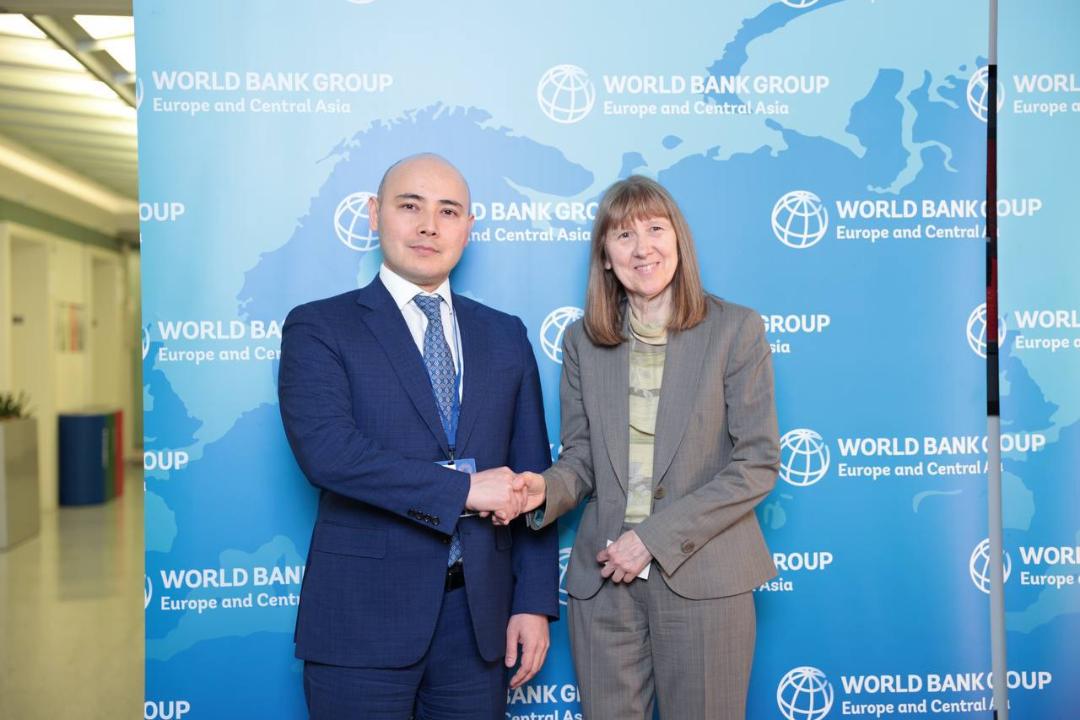ASTANA – Kazakh Minister of National Economy Alibek Kuantyrov attended the 2023 Spring Meetings of the World Bank Group and the International Monetary Fund (IMF) on April 10-16 in Washington D.C., discussing the country’s infrastructure, energy, socio-economic, educational, and digital development, reported the ministry’s press service.

Kazakh Minister of National Economy with Antonella Bassani, Vice President of the Europe and Central Asia Region. Photo credit: gov.kz.
At the Power Connectivity and Trade in Central Asia session on April 16, Kuantyrov highlighted the timeliness of the World Bank’s initiative to launch and finance a project aimed at improving energy connectivity among Central Asian countries. The project is designed to create a single pilot trading platform for the equal distribution of energy resources among Central Asian countries.
He also added that using the vast renewable energy resources of all countries in the region could help reach decarbonization by 2060.
“We plan to launch several large wind energy projects with international investors and expect further to increase the share of renewables through transparent competitive practices,” said the minister.
Kuantyrov discussed Kazakhstan’s progress towards carbon neutrality, socio-economic reforms, and macroeconomic indicators with Antonella Bassani, the newly appointed Vice President of Europe and Central Asia Region at the World Bank. The minister stressed the need to focus on infrastructure projects, energy, education system modernization, and digitalization.
The measures to improve tax and budget policies, deregulate business, denationalize the country’s economy, and improve its investment climate were on the agenda during Kuantyrov’s meeting on April 15 with senior representatives of Standard & Poor’s (S&P), Moody’s and Fitch Rating.
They discussed the current global economic situation and the challenges the developed and developing countries face, and exchanged their views on the Kazakh government’s reforms to ensure sustainable and inclusive economic growth amid the use of sanctions by other powers.
Kuantyrov emphasized decades-long cooperation with major U.S. companies at a roundtable with members of the U.S.-Kazakhstan Business Council, including Chevron, Boeing, Citi, and Pfizer. He noted a nine percent increase in U.S. investments and companies in Kazakhstan in the past year.
Bilateral trade turnover exceeded the pre-pandemic level, reaching $3.1 billion in 2022, 37 percent more than in the previous year. Exports of Kazakh-made goods increased by 32 percent to $1.2 billion, while imports of U.S. goods grew by 40 percent to $1.9 billion.
Julie Monaco, managing director and global head at Citi’s Public Sector Group, informed about the World Bank’s latest financial indicators and its development strategy during her meeting with Kuantyrov. The two discussed key challenges and threats to the global economy, current trends in the financial market and the banking sector’s problems.
On the final day of the Spring Meetings, Kuantyrov attended the Middle Corridor: Opportunities and Challenges seminar on the development of the Trans-Caspian International Transport Route (TITR). The participants explored how to unlock the potential of TITR and expand cargo flow from Asia to Europe by developing logistics and improving infrastructure.
They also discussed current issues and prospects for global and regional economic development, including the consequences of disruptions in transport and production chains and measures to curb inflation.
Kuantyrov also spoke with IMF experts about technical assistance on macro forecasting, modeling, and improving fiscal policy.

